
Air sampling field technicians collect and analyze air quality data to monitor environmental pollution and ensure regulatory compliance. They operate specialized equipment such as particulate counters, gas analyzers, and volatile organic compound (VOC) detectors at various outdoor and indoor sites. Expertise in OSHA standards, environmental regulations, and proper sample handling techniques is essential for accurate data collection and reporting.
Individuals with a strong attention to detail and a background in environmental science or industrial hygiene may find the role of an air sampling field technician suitable. This job likely requires physical stamina for outdoor work and the ability to operate technical equipment, which could be challenging for those with certain physical limitations. Those comfortable working independently and in varying weather conditions may be more probable to succeed in this field.
Qualification
Air sampling field technicians must possess a high school diploma or GED, with many employers preferring candidates who have completed specialized training or certification in industrial hygiene or environmental science. Proficiency in operating air sampling equipment, knowledge of OSHA and EPA regulations, and the ability to accurately collect and document air quality data are critical qualifications. Strong attention to detail, physical stamina for fieldwork, and effective communication skills for reporting findings to environmental specialists or regulatory agencies enhance job performance.
Responsibility
Air sampling field technicians are responsible for collecting air samples from various environments using specialized equipment to monitor air quality and detect pollutants. They calibrate and maintain sampling devices, document sample collection procedures accurately, and ensure compliance with safety and environmental regulations. Field technicians analyze site conditions, identify contamination sources, and collaborate with environmental scientists to support air quality assessments and reporting.
Benefit
An air sampling field technician job likely offers benefits such as hands-on experience with environmental monitoring equipment and exposure to outdoor work environments, which can enhance technical skills in air quality assessment. There is a probability of receiving health and safety training that supports professional development and workplace well-being. The role may also provide opportunities for career growth in environmental science or industrial hygiene fields.
Challenge
Air sampling field technicians likely face challenges related to accurately collecting samples in varying environmental conditions, which may affect the reliability of data. The probability of encountering technical difficulties with specialized equipment or contamination risks during sampling could further complicate fieldwork. Adapting quickly to changing site conditions and ensuring compliance with strict safety and regulatory protocols are also probable ongoing challenges in this role.
Career Advancement
Air sampling field technicians gain valuable hands-on experience in environmental monitoring, which serves as a foundation for advancing into roles such as environmental analyst, industrial hygienist, or health and safety specialist. Mastery of air quality assessment tools and compliance with regulatory standards enhances career prospects in government agencies, consulting firms, and industrial sectors. Continuous certification and specialized training in hazardous materials and data analysis further accelerate upward mobility within the environmental science field.
 kuljobs.com
kuljobs.com